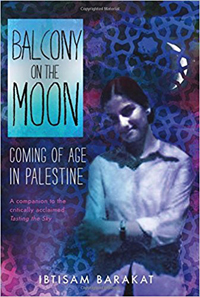 Ibtisam Barakat, Balcony on the Moon; Coming of Age in Palestine (New York: Farrar Straus Giroux, 2016), 217pp.
Ibtisam Barakat, Balcony on the Moon; Coming of Age in Palestine (New York: Farrar Straus Giroux, 2016), 217pp.
This new memoir by Ibtisam Barakat (born 1963) picks up where her award-winning Tasting the Sky (2007) left off. That earlier book described her childhood years living under the Israeli occupation after the 1967 Six Day War. Balcony is set in the 1970s, and concludes with her graduation from high school and admission to Birzeit University in 1981.
What's clear now is that even as a little girl, Barakat was a precocious and independent spirit who always wanted to be a writer. She imagined herself singing the athan, the Islamic daily call to prayer. When she was twelve, and despite vociferous protests from her parents, she got a summer job in a factory. She dared to ride her brother's bike even though her mother protested that girls were supposed to "keep their legs together." At school she started a pen pal club. At home she copied down English words and deposited them in a toy bank: "This is my word wealth," she writes, "and I plan to add to it daily so that I will have more language knowledge than my classmates have money."
As you would expect, there are also themes of an adolescent's political coming of age and consciousness — the curfews, snipers, check points, and bomb blasts. She begins to take notice of all the graffiti in Ramallah — the symbols, names, and events, she says, are "shreds of our [Palestinian] history." When she discovers the Universal Declaration of Human Rights, she copies the entire document into her notebook, and begins to quote it to people: "My father has a right to rest, article 24. Everyone has the right to work, article 23."
Similarly, as a young girl she chafed at the traditional constraints and gender roles placed upon girls. She did not envy her mother, who left school when she was thirteen, married at age fifteen, bore seven children, and spent her life cooking and cleaning for a family of nine people. Remarkably, her mother came to admire Ibtisam's independence, and under her daughter's tutelage at home, studied to pass her high school graduation exams.
No doubt (or at least we can hope!), there will be a third installment that describes Barakat's later move to New York City, her internship at The Nation, and development into an important feminist Palestinian voice as a writer, speaker, poet, and translator who's fluent in both Arabic and English. Today she lives in Columbia, Missouri.


